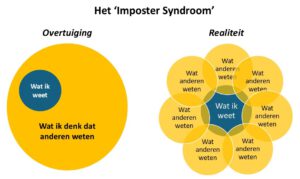How personal leadership helps you with 'imposter syndrome'

Do you struggle to see or experience your successes?
Do you find it hard to accept compliments?
Do you set unrealistically high standards for yourself?
Are you often dissatisfied with your work, even if others perform the same or less?
Does the feeling sometimes creep up on you that others will discover you are not as good as they think?
The imposter syndrome
If you recognise one or more of these signs, you may be suffering from 'imposter syndrome'. You then feel that your achievements and successes are not due to your own skills or efforts, but rather to luck or coincidence. Or that you fear others will expose you as an 'imposter', despite there being objectively no reason to doubt your abilities. Indeed, imposter syndrome is most common among people who are actually very competent!
The result of imposter syndrome is a vicious cycle of doubt and self-criticism. And that can ultimately undermine your self-confidence. What can you do? If you often suffer from this, it is important to become aware of it, and work towards a more realistic self-image.
Personal leadership: the basics
Personal leadership coaching can support you in this journey by increasing your awareness of your strengths, beliefs, and behavior patterns. Then you can manage yourself more effectively in your personal and professional life. This self-awareness is the first step to recognising and challenging limiting thoughts, such as those of imposter syndrome. Increasing your personal leadership can also be done in other ways: by working on perfectionism, for example. Or by setting concrete, realistic goals. Or by improving your communication skills.
Perfectionism
Many people with imposter syndrome strive for perfection. Personal leadership coaching helps you create more realistic expectations of yourself and deal with the fear of making mistakes, for example by learning that imperfection is part of growth.
Setting concrete goals and improving communication skills
Communicating more assertively, authentically, and confidently helps you make yourself and your ideas more visible to others. By setting achievable goals and developing strategies to reach them, you will experience more moments of success. This, in turn, builds greater confidence in your abilities and leadership.
A coach can guide you in working on the above areas. This will help you learn to (re)recognise your self-worth. To act from your personal strength, instead of from doubt and insecurity.
Lemongrass coaching
Lemongrass coaching would like to help you with that. With a free, no-obligation introductory meeting, we can tell you more about a personal coaching programme tailored to your needs.
If you would like to know more, please email jeannette@lemongrasscoaching.nl. Or fill in the contact form and you will be contacted within a day to schedule an appointment.
Literature:
Cadoche, E. & Monterlat de, A., (2021), The imposter syndrome, Utrecht: Prometheus
Stadelmaier, Vreneli (2014), (F)uck that uncertainty, Amsterdam: Prometheus/Bert Bakker
Hibberd, Jessamy (2019), The Imposter Cure, London: Octopus Publishing Group Ltd.
Request a free introductory meeting
Would you like to see if there’s a good fit? Request a free, no-obligation introductory meeting.
We will contact you within 24 hours to schedule an appointment.
Meet our coaches
Janique Wienk
Career and life coach/psychologist
Sandra Meijer
Career, Stress and Life coach/psychologist
Wendy van de Kragt
Personal leadership and Stress coach/psychologist
Jeannette Hakman
Personal leadership, Stress and Career coach/psychologist





